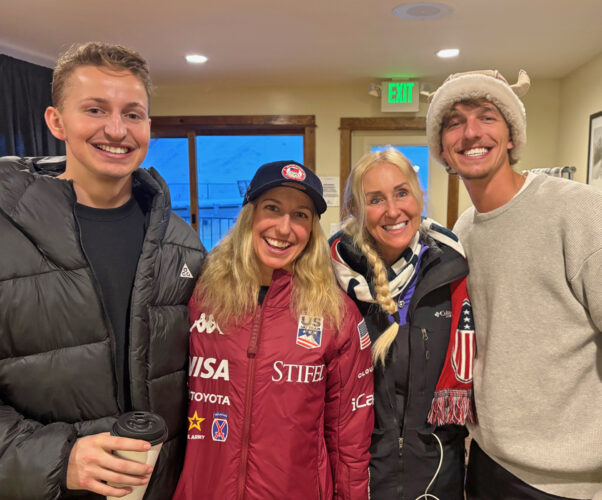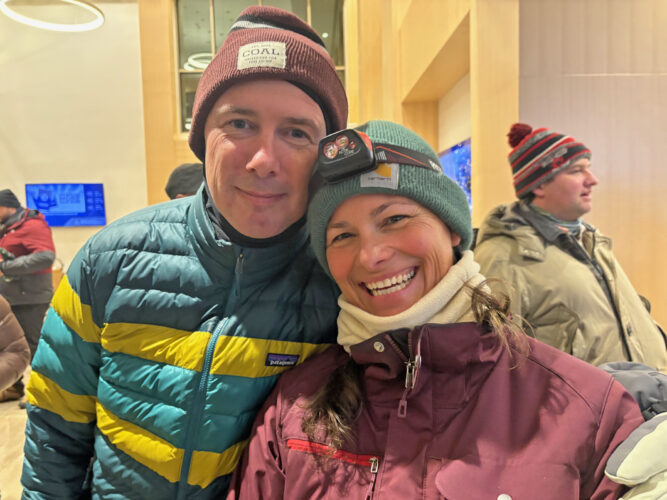ADIRONDACK FILM: Location management, scouting to be highlighted at film fest
A “jack of all trades” has a mediocre reputation.
The full saying is, “a jack of all trades, master of none, though oftentimes better than a master of one.” When it comes to location management on a film set, the saying quickly loses traction. As I listened to John Maher describe his work as a location manager for films such as “Tar” and “Oh, Canada,” I couldn’t help rewriting the saying in my head to, “A jack of all trades, master of many, and he’s down-to-earth despite his skill sets aplenty.”
Maher explained that the work of a location manager is practical and eclectic.
“It involves everything from scouting for locations to balancing the budget to fielding complaints from people who live next to film shoots,” he said.
The job is fast-paced, unpredictable, and exciting. The kind of person who flourishes in this work is adaptable, likes to problem-solve at the granular level, is quick on their feet, and enjoys a workday full of surprises.
“To be a location manager, you really need critical thinking to be your strong suit,” Maher said. “The job is about being able to solve problems as they arise and doing it all quickly and efficiently.”
Despite being an expert at many things — photography, management, concept development, logistics and communication — Maher is sensible even when he discusses working on films with top-tier celebrities. What matters the most in this industry, he said, is drive.
“The most important thing is to have the desire and will and energy to do the job,” he said. “If you’re half into it, then don’t even bother. It takes motivation to succeed. A project is all-encompassing.”
Maher will give a seminar at the Lake Placid Film Festival on the different elements of a location crew, from location assistant to scout to location manager. He is part of a series of events featuring film tradespeople that Gary Smith, chair of the Lake Placid Film Festival and Adirondack Film, has organized to promote local work in the film industry.
–
Scouting the Adirondacks
–
“We want to encourage local filmmaking and filmmaking in general in the greater Adirondack region,” Smith said. “There is so much potential for interesting work in the film industry, and a lot of the time people already have skills that are transferable to the film trade; it’s a matter of helping people understand the value of their preexisting skills and getting them educated when there are gaps in their knowledge.”
Smith described the disappointment he faces when a film crew is motivated to shoot in the Adirondack region but chooses another location because of insufficient personnel.
“We’ve come close to filming some big projects,” he said, “but we lose out to other locations because we don’t have enough film tradespeople. It’s always a letdown. Each film shot in the area would bring so much to the region.”
Not one to stew in disappointment, Smith worked hard to create momentum behind his Futures in Film program, a project that aims to introduce the array of film jobs available to locals. Maher’s talk on location management and scouting is part of Smith’s effort to inspire local interest in work in the film trade. There is a seamless connection between the work of a scout and Smith’s plan — given that every film needs a location scout, that is, someone who finds locations that complement the creative vision of the director and producer. Who better to scout for a film shot in the Adirondacks than a local.
–
A master of many
–
Maher described his job as multifaceted and continuously in flux. When a film begins, the role of a location manager is conceptual. They will help interpret the director’s imagination and render the ideas.
“At the beginning of a shoot, I help the director make their ideas a reality,” Maher said. “I’ll show the director samples of different things so that they can see the possibilities of what a given scene might be, what the era of the film might be, what the aesthetics of the film itself might be.”
As the film moves from concept development to shooting, the responsibilities of a location manager become predominantly logistical. Unlike the director who can imagine a film in the stratosphere, the location manager must have their feet firmly planted to ensure that the imagined film is realizable and works logistically.
“Part of my job is to make sure that it’s possible to shoot the film where we want to shoot while maintaining the director’s imagined world,” Maher said. “You might need a Wyatt-type house in a region that doesn’t have that type of architecture. So, what do you do?”
The location manager helps solve the problem — do you build the structure, import it onto location, or compromise the idea and work with what already exists in the region? The answer to the question is a balancing act between the projected idea and the projected budget.
The film world is populated with every part of life, and the location manager makes sure the world runs smoothly, on time, and on budget. Like the world itself, the film world is non-stop, making a 14- to 16-hour workday not unusual, and the problems that arise are as diverse as the personalities on set. As such, a good location manager is also an astute reader of people and personalities, a person who can understand what the director and producer want and satisfy both parties even when their interests are at cross-purposes.
“The producer is worried about budget, and the director wants to fulfill their dream of the project, and I’m hired to please both,” Maher said.
If the work sounds challenging, it is, but if it sounds draining, Maher will disagree. He described the work of a location manager as complex, interesting and meaningful.
“I’ve been doing this for three decades, and I do still love it,” he said. “I love these people that I work with. It’s my social circle. It’s my friends. You meet new people all the time for a shoot, and they instantly become people you care about. You’re with them a lot, and that’s something I’ve always enjoyed, and it’s something that still draws me into it. It’s a community.”
Maher will be at the Lake Placid Film Festival giving a seminar on location management and scouting on Friday, Oct. 31, from 11 a.m. to noon at the High Peaks Resort. He will also be part of a panel discussion the same day from 2:30 to 4:30 p.m. at the High Peaks Resort. It will be a 45-minute conversation on the creative and logistical challenges of work in the film trade and an interactive “speed networking” round where attendees can speak directly with panelists.
On the panel, Maher will be joined by practical effects specialist Anthony Pierce Clark, lighting specialist Justyn Davis, and costume designer Lisa Padavoni. The session will be moderated by Colin Fickes, program director of Stockade Works and a former film and television actor.
Whether you want to learn about the possibilities of work in the film trade or peek behind the curtain of the film world, come and join the community event.



